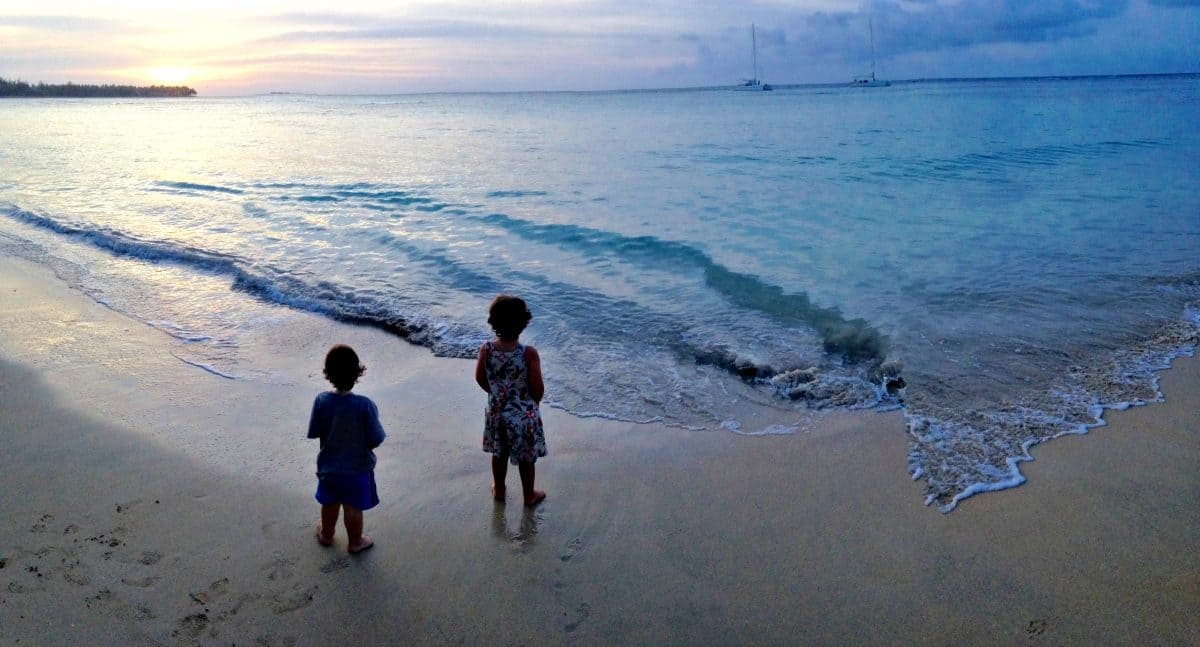Summary
- Living in the Dominican Republic
- The World is Their Playground
- They Learn How to Talk to Everyone
- What Living in the Dominican Has Taught My Children
- You Can Buy Coconuts in the Supermarket but Why When They Grow on Trees?
- Learn How to Be Kids
- You Say Hola, and I Say Goodbye
- You Don’t Need a Reason to Celebrate
We are in our 5th year of living in the Dominican Republic with our two babies that were born here, on this beautiful island. I know, immediately you think we live the life of tropical dreams: kids with messy, salt-water hair that knew how to surf before they knew how to crawl, coconuts for snacks, and piña colada happy hours.
While some days absolutely look like this, it hasn’t all been easy. Parenting never is. Living abroad brings unique challenges for any family.
Living in the Dominican Republic
However, there has been a lot we’ve learned from living abroad and, specifically, a lot that our kids have learned as a result of living in DR, all by the tender age of 4.
Learn more about the Dominican – Buy Dominican Republic – History, Culture and Politics on Amazon.
The World is Their Playground
When you’re living in the Dominican Republic where there is no need to check the weather because the forecast is sunny and sunnier, there isn’t much inside time.
Consequently, we spend our days at the playground, pool, beach, courtyard, basketball court, or wherever the sun takes us; our kids live their lives outside, endlessly playing in a continual summer.
- Thinking of Living Abroad? You might find some insights in What Every Expat Needs to Know.
They Learn How to Talk to Everyone

Dominicans are renowned for their social culture.
People engage casually with neighbors, and even strangers chat in line at the supermarket. For instance, a gas attendant once stood beside my car window the entire time to ask me about one of my dogs in the passenger seat.
This vibrant culture encourages interaction; therefore, when my daughter strikes up a conversation with a guard at the U.S. embassy, I find it unsurprising.
My kids have learned that communication is an essential skill for connecting with others and as a result, they are outgoingly fabulous because of it.
- * tiguere is Dominican slang for a hustler or street smart individual.
- * colmado indicates a corner store, akin to a bodega, found commonly in DR.
What Living in the Dominican Has Taught My Children
Living in the Dominican Republic has taught them to view everyone equally.
They readily say hi to the Haitians working construction, the nanny with the umbrella on the sidewalk, or the businessman they pass in the mall— to them, there is no distinction.
Moreover, manners—simple hellos and thank yous—are extended to everyone they encounter, not just the affluent families they observe daily at my husband’s school. Living in Santo Domingo has fostered acceptance and appreciation for people of all backgrounds.
You Can Buy Coconuts in the Supermarket but Why When They Grow on Trees?

It’s fascinating to consider that I never came across an apple tree as a child that would yield edible apples unless it was autumn and we went apple picking at an orchard. Not the case here.
In our complex, we have several coconut trees, a Guayaba tree, a banana tree, and a mango tree—all bearing pickable, eatable fruit.
Living in the Dominican Republic, kids and pregnant women are treated like mini-gods, akin to cows in India, but in human form.
For instance, people will stop their cars and let you cross the street when you’re pregnant, and kids enjoy the same right of way.
Our kids are often doted upon by older Dominican grandmas, young mothers, skater boys, and even Catholic nuns alike.
Learn How to Be Kids

If they’re running or making noise, no one looks at them with disapproval.
In fact, they don’t look at us and wonder why our kids are simply being kids. This culture embraces childhood enthusiasm, and it’s evident with mine.
They are fearless in public, expecting love from everyone around them—and they receive it abundantly.
You Say Hola, and I Say Goodbye
It was never in doubt that I wanted my kids to be bilingual.
As the first-generation Cuban-American in my family, I wasn’t always confident in my second language of Spanish, but I recognized the importance of being bilingual.
Consequently, I made the decision to speak to them only in Spanish before they were born; living in the Dominican Republic has made this process easier, especially since my husband works at an English school.
Getting to observe them navigate between both languages is— to put it lightly— absolutely incredible.
They know who to thank in English and who to say gracias to in Spanish without hesitation, effortlessly switching between the two. It’s quite impressive. Now, they’re embarking on mastering Spanglish.
You Don’t Need a Reason to Celebrate
It’s Friday afternoon, and we have friends over with their kids. People bring snacks; we order beers from the colmado*, create a fun playlist on YouTube, and it’s an instant party.
This same pattern continues on Saturday mornings for brunch, Sunday afternoons, or even Mondays because it’s the start of the week.
There’s no need for a birthday or formal occasion to enjoy time with friends here.
Dominicans cherish social gatherings; they relish in music (the louder, the better), rum drinks, and laughter.
Ultimately, there is no “right” reason to celebrate when every moment can be a reason to celebrate. Life becomes one big party if you simply keep dancing.




